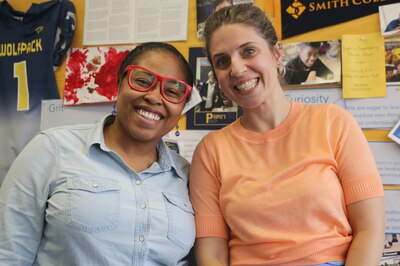Like high schools all across Newark this month, People’s Preparatory Charter School is celebrating the class of 2019.
But the graduates the school is feting at a gala Thursday are not those earning high school diplomas. The honorees are students who started at the high school when it opened eight years ago and now are finishing college.
“This year was a special year for us,” said People’s Prep founder and co-executive director Jess Rooney, “because it marked the official start of beginning to fulfill our mission.”
People’s Prep is one of a growing number of high schools and districts that have expanded their mission from simply graduating students to ensuring that they attend and complete college. To achieve that ambitious goal, the school has assembled a team of staffers to steer students into college and raised private money so it can keep supporting them until they earn degrees.
But even with extra assistance, college completion remains out of reach for many low-income students who may struggle to afford tuition and expenses, pass classes they weren’t fully prepared for, or adjust to life on campuses where few of their peers come from similar backgrounds. At People’s Prep, just 12 of the 42 students in that first graduating class who immediately enrolled in four-year colleges are graduating four years later. Another 13 are still working toward their degrees.
Shepherding alumni through college “is as challenging as the work we do with our high schoolers,” Rooney said. “In some ways, even more so, because the locus of control is now outside of the school.”
Across Newark, more high school graduates are entering college — yet relatively few make it to completion. Among Newark students who start college right after high school, just 39 percent earn degrees within six years, according to a recent report that tracked graduates of traditional and some non-traditional high schools.
While colleges face mounting pressure to usher their students across the finish line, some high schools and K-12 districts are trying to lend a hand.
The national KIPP charter school network, which operates a high school in Newark, has a long-running program called “KIPP Through College.” Program staffers help students make informed college choices, then monitor students’ progress on campus while working directly with colleges to ensure supports are in place.
Roger León, the new Newark Public Schools superintendent, is also trying to get more district students to make it through college. He has formed partnerships with local universities, hosted a college fair for juniors, and promised to add more advanced high-school courses so students are prepared for college-level work. Last week, he said he wants to eventually pair Newark graduates with mentors to coach them through college — an idea he said he got from a local philanthropist who is trying that with a small number of students.
“In high school, we will prepare every student to do well in college,” León told the state board of education. “If they go to a four-year college, we will have a mentor assigned to them for four years.”
People’s Prep is attempting to do the same — but without the scale of the Newark school district or KIPP, which also has many national donors. (In the fiscal year ending in 2016, KIPP spent at least $6.3 million on its college work, according to tax filings.)

The 380-student school opened in 2011 in a Central Ward building it shares with a district school. Hoping to avoid the situation in many high schools, where harried counselors must offer both social-emotional support and college advice to large caseloads of students, People’s Prep created separate mental-health and “college placement” teams.
The six-member college team is tasked with turning higher-ed from an abstraction into a desired destination. Starting in ninth-grade, students go on four campus tours per year — from hometown universities like Rutgers and New Jersey Institute of Technology to colleges in Pennsylvania, Connecticut, and even Texas.
They also take a college-themed course each year that starts with the basics, like the differences between public and private universities and majors and minors, before digging into the nitty-gritty of admissions. Juniors get free ACT tutoring and one-on-one help deciding where to apply — personal attention that is in short supply at high schools where each counselor is responsible for hundreds of students. (In the Newark school district, the student to counselor ratio is 654 to 1, according to state data)
“To be quite honest,” said Tahirah Crawford, who directs the college-placement team, “it takes a year of self-reflection for the student and intense conversations with the family for that list [of colleges] to come together.”
Seniors take an additional seminar where they work on their applications and discuss college life — from how to take advantage of professors’ office hours to navigating consent in sexual encounters and racism on campus.
Zianejah Sales, a senior headed to Rutgers-New Brunswick, said the frank conversations have helped her and her peers shed their “false perceptions” of college life. Her new reality came into sharp focus recently when she went to fill out paperwork at the school, which is less than 8 percent black.
“I felt a little, not uncomfortable, but I did have a mini culture shock,” Sales said, “because I was the only black girl in that room. Like 75 percent of the room were white males.”
The result: College enrollment at People’s Prep is only slightly below the statewide rate even though it serves a far needier student population than the state overall. About 73 percent of People’s Prep graduates in 2017 eventually enrolled in college, compared with 78 percent of students statewide, according to state data. (The Newark school district, whose share of low-income students is similar to People’s Prep’s, had a 54 percent college enrollment rate.)
The school continues its work even after its students start college. It employs an “alumni coordinator” who visits students once a semester and keeps in contact yearlong via phone and social media. The school has also helped cover the cost of textbooks and summer courses and held refresher classes in math and English so students can avoid paying for remedial courses.
Because state rules require that public school funds go to current students, People’s Prep paid for its alumni services this year using about $100,000 it raised for college work. As its alumni network widens, the school will have to raise even more money if it wants to continue offering the same level of support.
For now, the investment seems to have paid off for Na’sia Smith, one of the school’s first graduates who will be honored at Thursday’s gala.
Smith said that People’s Prep made higher education a focus from “day one.” Because her parents did not attend college, Smith said, she leaned on the school for help applying to college and securing financial aid. Now at Rutgers-New Brunswick, she relies on the alumni coordinator, Emily Kaplowitz, for academic and moral support: “Almost all of my ups and downs, she was there — no questions asked,” Smith said.
In December, Smith expects to graduate from Rutgers. Then she hopes to enroll in graduate school — a plan she’s already been discussing with People’s Prep.
“I’m done with the mission they promised,” she said. “Now I’m on to the next level and they’re still open to helping me get even further.”

